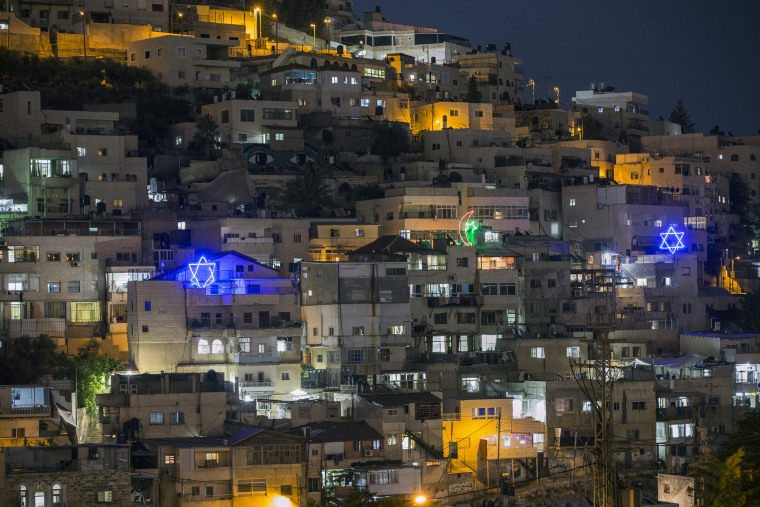JERUSALEM — Khadijih Awiedah used to keep an eye on her children through the gaping cracks that had developed in the walls of her apartment in the east Jerusalem neighborhood of Silwan.
Then, she says, her kitchen ceiling collapsed and in 2017,municipal authorities gave the family 30 days to repair their home or face a fine of $900. The Awiedahs said they could not afford to carry out the repairs and so abandoned their home, in an area Palestinians call Wadi Hilweh and Israelis refer to as the City of David, and moved in next door with relatives.
Awiedah, 57, and other Palestinians blame a major U.S.-backed Israeli archaeological dig, the so-called Pilgrimage Road, among others beneath the crowded hillside, for making this and other homes unlivable. Palestinian rights activists say the excavations are part of a much broader campaign to strengthen Israel’s claim to east Jerusalem, encourage right-wing Jewish settlers and eventually doom a future Palestinian state.
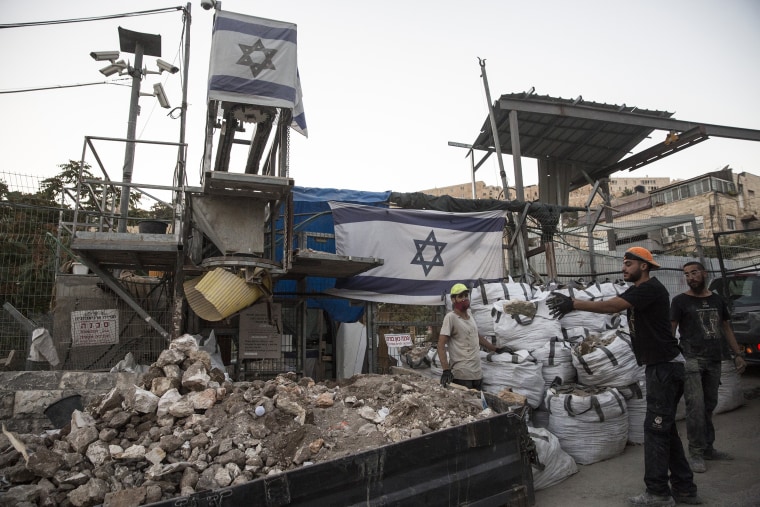
Awiedah is even afraid that her damaged apartment might be snatched away.
“Twenty-four hours a day, I’m afraid police will come, that settlers will come to the house,” she said as she perched on the corner of a sofa in her brother-in-law’s apartment where she now lives. “The tension is high.”
Doron Spielman, the vice president of the City of David Foundation, a nonprofit founded in 1986 that sponsors digs beneath the neighborhood, rejects charges that his organization is trying to displace Palestinians.
He said the group is eager to help anyone whose home has been damaged.
“Even if there is a simple doubt that this could be caused by us, we fix it,” he said.
But there is little trust among Palestinians for Israeli authorities or associated organizations. When asked if they would speak to the City of David Foundation about the damage to their vacant property, the Awiedahs said they were afraid that any interaction with the group or the Israeli authorities would ultimately lead to settlers finding a way to take their home.
“The moment you ask settlers to help, they will take the house,” Awiedah’s husband, Sliman, said. Spielman denies this is the case.
The municipality told NBC News that no connection was found between the cracks in the Awiedahs’ walls and the excavations taking place deep below the ground, and it stressed that “in any case” the owner is legally obligated to repair the damage.
The Israeli Antiquities Authority, which is carrying out the digs at the site, said accusations against its excavation of a parking lot in the neighborhood had been raised in the past by “politically driven entities.” Israel’s Supreme Court rejected the claims in 2009, it added.
Peace Now — a group that advocates for the establishment of an independent Palestinian state — said it was among the 27 petitioners who requested that the excavations of the parking lot be stopped.
‘Fiber of our being’
Low concrete, sand-colored Palestinian homes rise up the hill that sits a stone’s throw away from the corner of the Old City known to Jews as the Temple Mount, the holiest site in Judaism. It’s known to Muslims as al-Haram al-Sharif, or the Noble Sanctuary, Islam’s third-holiest site after Mecca and Medina. Outnumbered by Palestinians on the hill, Jews here tend to live in fortress-like buildings protected by high walls, fences and security cameras and in some cases by guards.
At night, enormous lights in the shape of Islam’s star and crescent or Judaism’s Star of David vie for attention and illuminate the darkness from the other side of the valley.
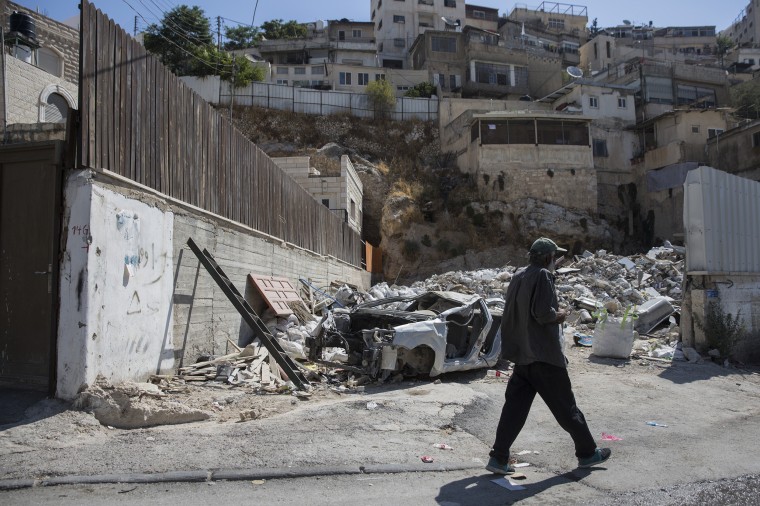
This part of ancient Jerusalem was rediscovered in 1867 by Sir Charles Warren, who was sent by Britain’s Queen Victoria to bring back treasures from the Holy Land. During the Six-Day War a 100 years later, Israel captured and later annexed all of east Jerusalem.
Now, hundreds of thousands of visitors flock to the City of David excavation every year. The curated underground world invites tourists to walk through the ancient streets, wade through underground water systems and marvel at findings that include clay seals of Hebrew names that appear in the Bible, including those of King Jehoiakim’s scribe and two ministers of King Zedekiah, the last king of Judah.
Spielman insists the land is Israeli and Israelis should be able to live there too.
“What they’re taking stock of and taking issue with is not the supposed cracks in the walls, it’s the actual archaeological excavation itself, it’s the meaning of the excavation,” he said, referring to Palestinians’ concerns about the excavation of a subterranean Roman-era road running beneath the neighborhood.
The City of David Foundation says the road, which was discovered in 2007, was used by Jewish pilgrims to travel from the Pool of Siloam up the hill to the Second Temple some 2,000 years ago.
“The Jewish people have a three-millennia-plus connection to Jerusalem,” he said. “It is part of the fiber of our being.”
Any future negotiation as to whether east Jerusalem could be the capital of a future Palestinian state, Spielman said, would need to be based on what he described as this “archaeological truth” of the City of David.
Arguments like this, according to Palestinians and Israeli civil rights advocates, reveal what they consider to be the true purpose of the excavations: not so much to search for archeological truth but more to establish a historical justification for increasing the Jewish presence in east Jerusalem, which most world governments consider to be illegally occupied.
The excavations are, they say, one in a list of methods employed by right-wing Israelis to suppress the national aspirations of Palestinians, including restricting building permits for Palestinians, purchasing property, disputing property ownership and demolishing houses.
“For the first time since 1967, we are on the cusp of evictions in east Jerusalem in scope and numbers we haven’t seen before,” said Daniel Seidemann, an Israeli expert on Jerusalem and a prominent critic of what he considers to be right-wing expansionist policies.
The human rights group B'Tselem has said that some 165 Palestinian properties built without permits in east Jerusalem were demolished on the orders of Israeli authorities in the first 11 months of 2019, the highest number in any year since it began keeping records in 2004. B'Tselem said 317 people had lost their homes by the end of November, including 176 minors. Palestinians and their supporters say it is virtually impossible to get building permits and permission to extend or modify their homes.
The demolitions or confiscations of inhabited Palestinian homes in Area C of the West Bank, which is under full Israeli civil and military control, doubled between 2018 and 2019, from 49 homes to 99, according to the United Nations. Dozens of other structures including agricultural, to do with livelihood or uninhabited properties were also demolished.
Last year, 13 inhabited homes were demolished just in the neighborhood of Silwan, compared to one in 2018.
Seidemann, who runs Terrestrial Jerusalem, an organization that tracks developments in the city that could affect the political process or destabilize it, describes a collusion between the Israeli government and Jewish settlers, who he says are intent on displacing Palestinian residents in the greater neighborhood of Silwan.
“The settler DNA has been injected into all organs of Israeli government and municipality and the distinction between settlers and government is blurred,” Seidemann said.
Powerful supporters
With the persistent political deadlock that has thrown Israel into a third election in 12 months, the Israeli government’s long-term policies on east Jerusalem and a possible Palestinian state remain unclear. It is also not clear whether any restraints will be imposed on right-wing settlers, in part because they have powerful supporters.
The Trump administration’s ambassador to Israel, David Friedman, played a central role in the inauguration of the Pilgrimage Road excavation.
On June 30, Friedman was pictured swinging a sledgehammer at a ceremonial wall that led to the excavation. According to the City of David Foundation, the Israeli government has allocated 43 million shekels (some $12 million) to excavations in ancient Jerusalem, of which a significant portion went to this project. In total, it will cost close to $100 million, the foundation added.
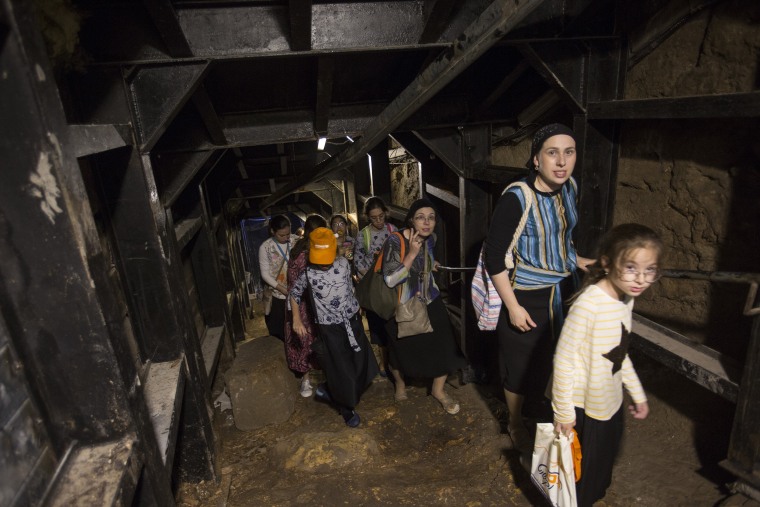
The United States’ involvement in the ceremony was taken by many Palestinians as the latest sign that the Trump administration has little interest in their national aspirations, and comes after President Donald Trump’s decision to move the U.S. Embassy from Tel Aviv to Jerusalem and his recognition of Israeli sovereignty over the Golan Heights.
For Hagit Orfan, an analyst with Peace Now said developments such as the City of David represent a big threat to those ambitions.
In trying to transform Silwan into a “Disneyland of Jewish heritage,” right-wing Israelis are using archaeology to transform the area into a Jewish neighborhood in the minds of the public, Orfan said.
“They say we cannot bring the masses to live in Silwan, but we can bring the masses to visit Silwan,” she said. “It will be part of what Israelis see as Israel.”
The Israeli government’s plans for a cable car that would whisk tourists from the western part of Jerusalem, over Silwan, and to the eastern Old City in a matter of minutes are also progressing. Palestinians and rights groups are concerned that the project will mean tourists bypass the neighborhood and leave Jerusalem with a sense that it is solely a Jewish city.
And Israeli families are also moving in.
Since 1991, some 400 Israeli settlers have moved to this pocket of Silwan, according to figures collated by Terrestrial Jerusalem— the City of David Foundation estimates the number is closer to 1,000.
The steep slope, crammed with Lego-like houses, is already home to between 5,000 and 6,000 Palestinians, Terrestrial Jerusalem estimates.
None of the Jewish residents agreed to be interviewed, and several of them closed gates, car doors or rolled up their windows to avoid interaction.
Arieh King, a member of the Jerusalem City Council, is the founder of the Israel Land Fund, a right-wing, nongovernmental organization devoted to acquiring all the land of Israel, including occupied territories, for the Jewish people.
“We don’t need to have excuses why we are returning to the City of David because this has belonged to us for thousands of years,” King said.
“Forever, Jews will live here.”
‘Land of the Muslims’
Amal Sumreen, a 49-year-old Palestinian, recalls the night in the early 1990s when settlers seized the land on which her family kept chickens and grew fig trees. Some 30 years on, most of the family’s yard is now part of the City of David’s visitor center.
On Sept. 20, Jerusalem’s Magistrate’s Court accepted an eviction suit filed against the family by a subsidiary of the Jewish National Fund — a not-for-profit founded nearly 120 years ago to buy land in what was then-Ottoman Palestine — and ruled that the family should be evicted within three months. The Sumreens’ lawyer, Muhammad Dahleh, said the family had appealed the decision.
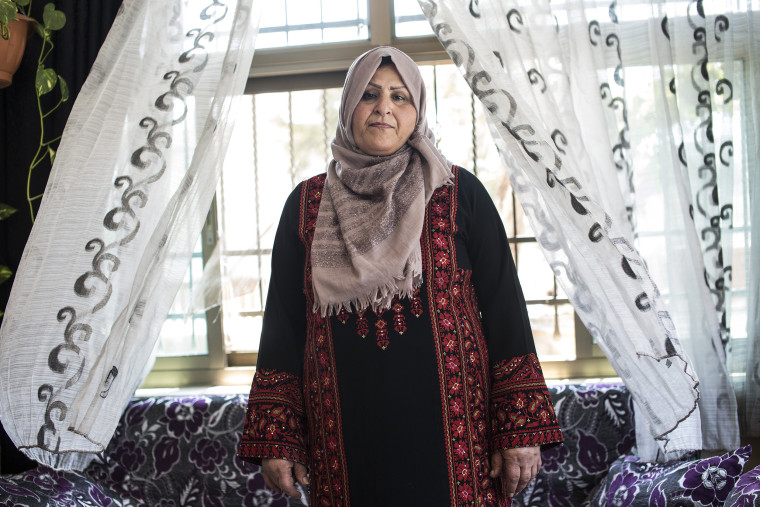
Sumreen, a mother of nine, countered the argument that the land belonged to Jews.
“This is the land of Muslims, this is Jerusalem,” she said.
The case against her family is based on a 70-year-old Israeli law that allows the government to seize land of Palestinians living in an “enemy” country, according to Dahleh and Peace Now. The law is one of the raft of ways that Palestinian lands are unfairly expropriated, Palestinians and their supporters say.
The Jewish National Fund said that in multiple judgments handed down by the courts over the years, it has been “unequivocally” proven that the Sumreen family has been forging documents and making false claims, and that the fund owns the property.
Sumreen said she was terrified of losing her home and made a direct plea to Trump.
“I beg President Trump to feel sympathy for us, do not work against us — protect us from the settlers,” she said.
